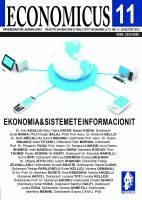Modelimi me agjentë heterogjenë ndërveprues si një qasje moderne ndaj kompleksitetit të ekonomisë
Modeling with heterogeneous interacting agents as a modern approach to the complexity of the economy
Author(s): Eniel NINKASubject(s): National Economy, Supranational / Global Economy, Economic development, Financial Markets, Socio-Economic Research
Published by: Shtëpia botuese “UET Press”
Keywords: Complex Adaptive System; Agent-based modelling; Heterogeneous Interacting Agents; Emerging Macroeconomics;
Summary/Abstract: The Neoclassical Paradigm dominated the XX century Economics. Its foundational elements are fully rational and longsighted consumers and producers who maximise their utility and profits and make choices in a world with finite resources which eventually moves the economy towards the point of equilibrium. This paradigm builds on the mechanistic and reductionist view of science which makes use of mathematical tools on the study of economic phenomena. The reductionist approach is materialized in the use of the representative agent which has been crticized by several economists. They suggest to consider the economy as a complex system in which the interactions of a multitude of heterogeneous agents at a micro level generates the emergence of phenomena at a macro level. This is the philosopy of the Agentbased Modelling Approach which considers the economy as an Complex Adaptive System. The aim of this paper is to build a model which, through simple rules of behaviour of agents at an individual level, manages to produce some empirical regularities at a micro and at a macro level. The model describes an economy composed of firms, households and banks. Firms belong to two distinct industries. There is an upstream industry which performs R&D and produces Intermediate Goods by means of high skilled human resources. And there is a downstream industry which produces a homogeneous, non storable, Consumption Good by means of low skilled human resources and Intermediate Goods. Households offer their labor in the Labor Market and try to fully spend their income in Consumption Good. Simulations of the model reveal that a fully decentralized economy, with no help from the Walrasian Auctioneer, is able to display regular behaviour on a macroeconomic scale. We grow an economy that replicates some interesting stylized facts both at the industrial dynamics level and at a macroeconomic scale. At the end, the message that this work would like to bring is methodological: agent-based techniques represent a practical and feasible approach of doing research in the world of complexity economics.
Journal: ECONOMICUS
- Issue Year: 11/2013
- Issue No: 1
- Page Range: 20-33
- Page Count: 14
- Language: Albanian

